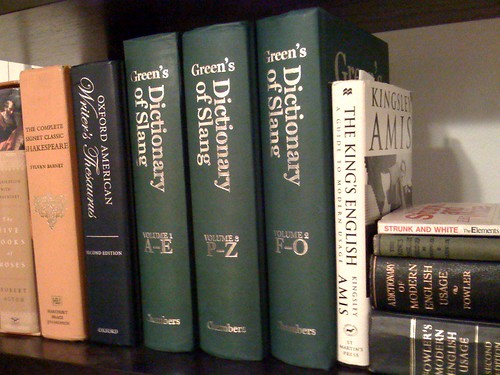Thanks to Jonathon Green’s magnificent three-volume Dictionary of Slang, which arrived yesterday compliments of Oxford University Press, I’ve already learned that the first recorded use of “bad shag” dates to 1788, that to “beat skin”* (1944) doesn’t mean what you think, you pervert, and that the term “dude” was once (1883) considered so offensive that “a vigorous Bloomington woman cowhided a clerical editor for calling her a dudess.” (Eternal disclosure.)
“Courage pills” (1933) are heroin in tablet form. “Coño,” a hometown favorite, gets an entry, as it should; you might want to look it up before you run out into the streets and start shouting it at people. As for “douchebag”: raise your hand if you’d like to see a usage shout-out to Alex Balk, circa TMFTML; has any single man in history worked as tirelessly, and as effectively, to restore an epithet to the lexicon, with so little recognition?
More to come — I’m still making my way through Volume 1 — but for now do read Colin MacCabe’s review for the New Statesman. An excerpt:
In these three volumes, Green has dared to put slang on the level of The Oxford English Dictionary, offering illustrative citations, arranged in historical order, for all of his headings and subheadings.
Such a venture runs into the problem that slang has a particular affinity with the spoken rather than the written language. And, indeed, with the exception of certain 17th-century dramas, the early sources are mainly specialised “canting” dictionaries that promised to furnish the innocent countryman with a guide to the evils of the city. It seems to be impossible to imagine slang without cities, without worlds in which anonymous figures can speak to you in words you cannot understand.
The rise of the novel led to an ever-increasing representation of forms of speech both low and high – and slang is always refreshingly low. The significant burst of written sources comes with universal literacy and pulp fiction at the turn of the 20th century. But then there is also cinema, as well as popular music, television and now the internet. Green, with an industry to match Dr Johnson’s, has ploughed through his sources, and offers, in his Dictionary of Slang, both an extraordinary contribution to our understanding of the history of the language and one hell of a good read. If we take our three underground phrases and consult Green, we find that the use of “pig” as a word for the forces of authority dates back to the end of the 18th century and the struggles that pitted the corresponding societies against Pitt’s repressive state. One further discovers that “get one’s act together” comes from United States black English, probably the single most fertile source of slang in the 20th-century anglophone world and the source of such other staples of the countercultural vocabulary as “heavy” and “groovy”. “Front”, in the sense of to advance money, is first quoted as late as 1961, but “bread” in the sense of money dates back to 1938 – though all the quotations place it in that creative linguistic circle that surrounded black music.
It is here that one migh
Add a Comment


